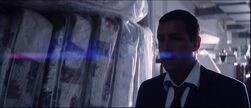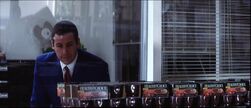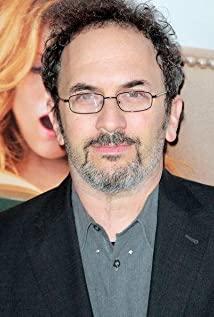From the first shot, in the corner of the huge room, Barry played by Adam Sandler has been talking on the phone. Although his tone is very peaceful, the content of the conversation gives people a sense of oppression. I believe that whether it is a phone call On the other end, the audience in front of the screen can feel this. At this time, the camera hiding in the corner seemed to be staring at him, and then the camera followed Barry out of the office. A zoom lens highlighted the foothold of the line of sight-the road. This is a type of long shot that often appears in Anderson's works, and the basic information is explained through the walk of the protagonist, and then the transition is completed. The opening scene of Boogie Nights is a classic example. The camera followed Mark Wahlberg and involved a large number of roles. This kind of rhythmic control is completely a technical display of fluent technology. Going back to the opening scene in this film, it is just a shot, but the amount of information it conveys cannot be underestimated. From the compositional point of view, the male protagonist forced to the corner is obviously in a state of imbalance, we will guess him He is a somewhat closed person, and when we observe that the color of the male protagonist’s suit is very similar to the color of the office walls, we have verified our judgment. This kind of self-protection mentality in disguise is actually a manifestation of inner marginalization.
A careful analysis of the character of Barry reveals that most of his depression comes from his huge family of seven sisters. Barry, who grew up in this atmosphere of prosperity and decline, has a sensitive heart. He doesn't know how to get along with women, so he occasionally makes pornographic phone calls for comfort. The most unfortunate thing is that he does not have the ability to regulate emotions. An obvious example is that at his sister’s birthday party, Barry, who couldn’t stand his tongue, smashed the glass angrily, and once when Barry and Lena were dating in a restaurant. Lena inadvertently mentioned Barry's childhood scandal, and Barry with a smile on his face secretly went to the bathroom to vent. This kind of hysteria of Barry is in great contrast to his polite appearance. Sometimes he is more like a child whose emotional mechanism has not been fully established, such as when he wants to exchange pudding voucher for flight mileage. The stubbornness of Barry and the panic when the fact that the little piano was picked up was revealed, these childish behaviors have injected the charm of details into the character of Barry.
In fact, the core of the film is a true love story, and it is the most traditional model of love at first sight. What is impressive is the first encounter between Barry and Lena. The scene under the backlight is full of dreams, especially when the sun shines on Lena's hair, it all looks beautiful. Emily Watson, the actor of Lena, is not the kind of beauty in the true sense. Anyone who has watched "She is Lonely Than Fireworks" will definitely remember the talented cellist played by Watson. She has a kind of general The temperament that an actress doesn't have, whether it's paranoid or a little neurotic, in short, it matches the style of this movie. If you change to a normal sweetheart beauty, the audience will definitely question this love, and Watson's performance makes us believe that Lena is the angel that will eventually appear in Barry's life.
After gaining true love, Barry has a distinct personality change. From the cowardice of hiding behind a wall when he first met, to the first time he got on a plane in order to trace Lena's life, Barry gradually walked out of his closed self. The most critical conflict occurred when Lena was injured and hospitalized because of Barry. The resentment accumulated before that was all gushing out, and the violent factors flowing in Barry's bones were released in the name of love. The climax happened when Barry went to provoke the head of the porn phone company played by Philip Seymour Hoffman. He blurted out the phrase "I have some love in my heart now. This makes me extremely strong." At that moment Barry completely completed the transformation, and this is also the most fascinating part of the film, it conveys the power of love.
To be honest, it is a pretty bold decision for the director to use Adam Sandler as the leading actor, because Sandler has already formed the impression of a comedian in the hearts of the audience, how to turn him from a gag silly boy into a film Barry, a man who is a little anxious and longing for love, is a huge test for the director. Actors with distinctive characteristics like Sandler can easily label their films, so that the audience will eventually ignore the director calling these films Adam Sandler’s works. The great thing about Paul Thomas Anderson lies in his completeness. Hidden actors like Sandler in the play, instead of using their inherent performance style to gain gimmicks, this kind of difficulty in reshaping actors is completely beyond the need to train a newcomer. Similar successful examples include "NuanNuanNei" Jim Carrey in "Ham Light". So in the end, what the film shows is a complete work of Anderson. Of course, this does not mean that Sandler's performance is not prominent enough. On the contrary, this kind of complete integration of the role is the characteristic of a good actor.
View more about Punch-Drunk Love reviews











